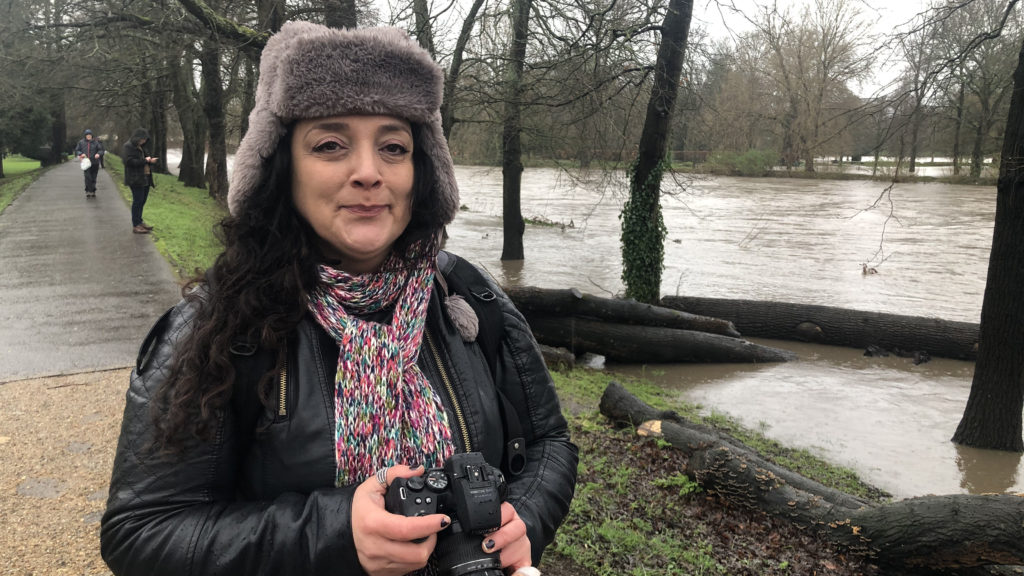In the wake of Storm Dennis, is enough being done to protect the city from climate change?
Crowds of people stood on a bridge next to Cardiff Castle, taking photos of the serious flooding in Bute Park, where most greens were submerged by the filthy, muddy water overflowed from the River Taff.
This came as Storm Dennis brought strong winds and over one month’s worth of rain to Wales within two days. Erin Harper, one of the residents at the scene, said she has never seen this height of river level in her whole life.
“This is not normal,” the 37-year-old said. “People get used to the storm though because it happens every year, but the weather is getting extreme. It should be really cold during this season and it should be snowing… The climate is changing and this flood is unusual.”
She, an office worker whose hobby is photography, was using a camera to record this unprecedented view, saying: “ There is nothing much the Welsh government can do actually. Perhaps just planting more trees and building barrages.”

Over the past two weeks, the UK has undergone two consecutive storms with only a short period of lull.
Many places had not even fully recuperated from the damage and the ground was saturated by the floods following storm Ciara when Storm Dennis hit.
More than 300 flood warnings were issued across the country, especially in South Wales, several cities saw rivers bursting out the banks, houses engulfed in floodwater, and properties swept away.
Natural Resources Wales launched a severe flood warning for the River Taff on Saturday evening, which means the power of floodwater can pose a threat to life.
Serious disruptions occurred in communities near the upper River Taff such as Pontypridd, where the whole streets remained underwater.
Loan Dyer, a presenter of GTFM radio, witnessed the river overflowing in multiple locations in Wales.
“I’ve never seen the levels of water like this since I started working here 22 years ago. I saw people evacuating their homes, roads shut off, and the fire brigade rescuing people with boats,” he said.
Cardiff was relatively less affected since the fast-flowing water became more steady in the downstream area.
But most public areas were invaded by the powerful floodwater, which battered down trees and signposts, causing major disruptions to commuters.
An 83-year-old Cardiff resident, Peter Phillips, said compared with the last two damaging floods he experienced in the 1960s and 1980s, Dennis was not the fiercest storm he has ever seen. However, the unusual river level showed a sign of deteriorations in the environment, resulting from human activities.
“We don’t know what would happen next. Because of climate change, it’s hard to say if the water level will get out of control or not,” he said, staring at the flooded Bute Park with a worried look.
He added that the major factor of the flooding is because “the government put a lot of trees down. That’s the answer to this situation”.
Phillips then criticised the authority for not listening to the people. “The weather is too mild now and the government hasn’t done enough to tackle climate change. I think a 6-year-old young child can get more brain than what they got into the assembly.”

But some praised the government’s response to the emergency and its rescue operations in the immediate aftermath of the storm. As Dyer said, “It’s difficult to see anyone preventing these storms. The main point is that people were made aware of and no loss of life in the Pontypridd area.”
Environment Secretary George Eustice said on Sunday that the UK government already spent billions of funds on flood infrastructure but the improvement was limited.
He told the BBC, “We’ll never be able to protect every single household because of the nature of climate change and the fact that these weather events are becoming more extreme, but we’ve done everything that we can do with a significant sum of money, and there’s more to come.”
After the tragedy caused by Storm Dennis with at least three people dead, some places still remain flooded, leaving the whole nation in chaos with considerable recovery work required to be done.
According to the Guardian, politicians from all parties have admitted the connection between climate emergency and disasters that happened all over the country, but lack consensus on how to respond.

Meanwhile, scientists have urged the government to brace for more intense rainfall by increasing the number of natural drainage infrastructures, warning that in the upcoming years more storms will hit the UK due to the extreme climate.
They explained that this comes from the accelerating tendency of global warming, which allows the warmer atmosphere to absorb more moisture than before.
Erin Harper, one of those who are calling for a huge, positive change from the government, said she joined the environment protests last year because she realised only relying on individual actions was insufficient.
“Things people are doing like recycle, not driving, and not flying. They are just being done on a tiny scale. The problem is that people on the top didn’t do anything. They are just carrying out the way they wanted to,” she said.
Certain communities in the south and north-west Wales still struggle with the continuous downpour and flooding in the wake of Storm Dennis.
Clear-up operations have been carried out in parts of Cardiff such as Cardiff Bay and Bute Park.
Ms Harper said apart from the recovery work, more natural flood systems and environmental policies should be launched by the Welsh government.
“It’s terrifying. We need to think about what we want our future to look like.”
